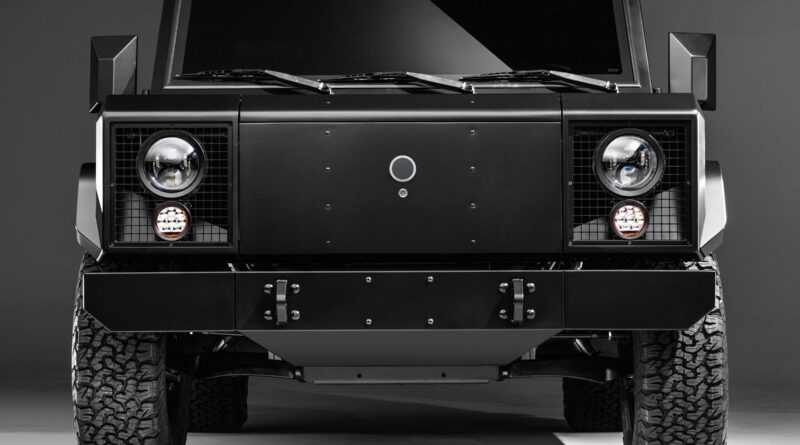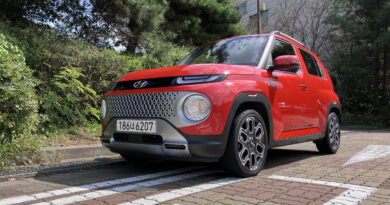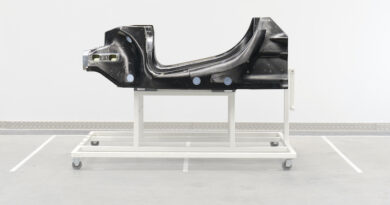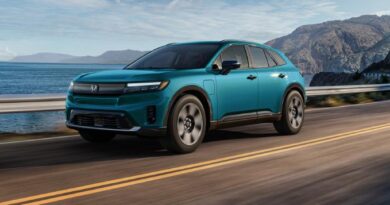Bollinger EV expansion; B1, B2 ‘trucks’ on track for late 2021
The COVID-19 pandemic has taken its toll on car makers globally but EV startup Bollinger is using the unprecedented times to its advantage as it plans an expansion of its Detroit-based operations.
The CEO of the American soon-to-be-car-maker announced the company plans to double its modest team to 80 by the end of 2020 and plans to produce its boxy all-electric SUV and pickup trucks – called the B1 and B2 – by the end of 2021 (production was initially planned for 2020).

Earlier this month Bollinger moved into the offices of now-defunct electric car startup Borgin, which succumbed to financial pressures during the coronavirus pandemic.
Bollinger said the need to social distance in some way fast-tracked the move to new offices.
“It couldn’t have come at a better time,” said CEO Robert Bollinder. “We were bursting at the seams with new engineers, putting desks out in the shop at the old building; it was especially difficult to keep everyone more than six feet apart.”

Bollinger’s EV offerings are like no other, boasting simple boxy styling with an aluminium body (just like the Land Rover Defender made from 1948 until 2017) and military-inspired detailing that makes for a rugged, purpose-built machine.
Unrelated to certain kids’ bananas, they’re known as the B1 and B2; the B1 is an SUV and the B2 a pickup truck that’s also available as a cab-chassis, in either single- or double-cab.

Bollinger prefers to call both trucks: the B1 being “the world’s most capable sport utility truck” and the B2 “the world’s most capable pickup truck”.
Old school industrial design
Beyond the marketing muscle, styling is clearly a major focus.
The doors and windscreen of the B1 and B2 can be removed for open-air driving and there’s an optional roof made of glass panels.

There are very few rounded edges with rivets and welded seams more prominent.
Circular LED headlights are flanked by an industrial-looking metal mesh 18-inch tyres are suitably chunky BF Goodrichs.
Both the B1 and B2 have a sizeable 142kWh battery pack claimed to cover about 320km between charges.
Each has two electric motors, one for the front wheels and one for the rear and the combined output is 614 horsepower, or 451kW. The claimed 0-60mph (0-96km/h) time is 4.5 seconds.

The payload is at least 2268kg and tow capacity rated at 3.4 tonnes.
Underpinned by the company’s bespoke electric chassis – marketed as Chass-E – it can be configured with different wheelbases and a battery pack up to 180kWh.
Even the interior is an old school fusion of flat surfaces that focuses on the basics such as seats and a (round) steering wheel.
There are no fancy digital screens or airbags.

Luxury runs to optional heated seats. Speaking of seats, there are only four, with no plans for more.
Extreme off-road – at a price
The challenge for the Bollinger B1 and B2 will be pricing. Both start at US$125,000 ($175,000), which puts them way at the top end of the anticipated price of other chunky electric off-roaders, including Tesla’s much-hyped Cybertruck, which starts at US$39,900 ($56,000).
There’s an extreme off-road focus for the B1 and B2 too; each has disconnecting front and rear sway bars, allowing for more wheel articulation. 4x4s are expected to benefit from electric tech.
However, Bollinger is looking way outside the traditional SUV and pickup markets, saying its Chass-E structure can be configured for “delivery vans, bucket trucks, ambulances, rescue trucks, shuttle buses, reconnaissance vehicles, and more!”.
While Bollinger plans to produces its vehicles with the steering wheel on the right, it says the American market is the focus initially as it plans to gain a foothold but that “we are planning for export markets as well”.

As for where Bollinger will manufacture its vehicles, that is still not known publicly.
The company plans to enlist a third-party manufacturer, which it plans to confirm soon.
The company also isn’t planning on establishing a dealer network, instead “working with independent dealers throughout the world to offer sales and service”.
EV truck rivals gearing up
Competition is ramping up, too.
EV offerings from Rivian, Lordstown and Nikola all promise to shake up the emerging electric market while Tesla’s Cybertruck has polarised opinion and created a stampede of interest.
Traditional pickup truck manufacturers such as Ford and Chevrolet are also promising big EV things.
And from the UK the newly-founded Ineos brand plans big things for its upcoming Land Rover Defender-inspired Grenadier, which the company one day wants to offer with a hydrogen fuel cell.




